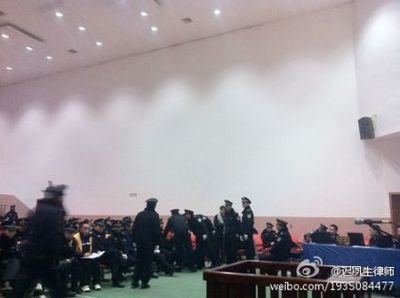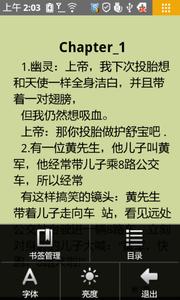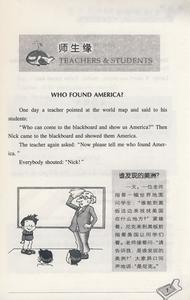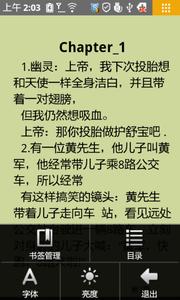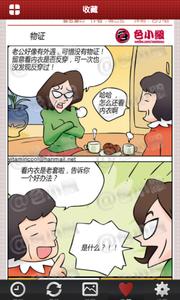英语笑话是指以一句英文短语或一个英文故事让说话者和听者之间觉得好笑,或是产生幽默感,笑话是一种经过艺术加工的语言形式,是艺术化的语言,笑话是一种艺术方法。下面是小编整理的英语爆笑笑话6篇,以供大家阅读。
英语爆笑笑话一:Two roaches 两只蟑螂Two roaches were munching on garbage in an alley when one engages a discussion about a new restaurant."I was in that new restaurant across the street," said one. "It's so clean! The kitchen is spotless, and the floors are gleaming white. There is no dirt anywhere--it's so sanitary that the whole place shines.""Please," said the other roach frowning. "Not while I'm eating!"
两只蟑螂正在一条小巷的垃圾堆上大吃着,其中的一只谈起了它在一家新开张的餐馆里的经历。“那时我在街对面的那家新餐馆里,”它说。“那里太干净了!厨房没有一点污渍,地面闪着白光。任何地方都没有垃圾。那里是如此干净,整个地方都在发光。”“请不要在我吃东西的时候说这个好吗?”另一只蟑螂不悦地说。
英语爆笑笑话二:我需要器官移植The patient is adamant. "Doc, I need a liver transplant, a kidney transplant, a heart transplant, a cornea transplant, a spleen transplant, a pancreas trans. . ." "What makes you think you need all these?" Well, replied the patient, "My boss said if I wanted to keep my job I needed to get reorganized."
这个病人显得很坚决。“医生,我需要做肝脏移植、肾脏移植、心脏移植、角膜移植、脾脏移植、胰腺移植和……” “你为什么认为你需要做这么多移植手术?”病人回答:“哦,是这样,我的老板说如果我这个人不重新组装的话,就别想保住我的工作!”
英文爆笑笑话英语爆笑笑话三:埋在花园里的枪Guns Buried in the Garden An old man lived alone in Northern Ireland. His only son was in prison. The old man wanted to plant some potatoes in his garden but he didn't know anyone who would help him plow up the garden. He wrote to his son about it, and received this reply, "For HEAVENS SAKE, don't dig up that garden, that's where I buried the GUNS!" At 4 AM the next morning, a dozen British soldiers showed up and dug up the entire garden, but didn't find any guns. Confused, the man wrote to his son telling him what happened and asking him what to do next. His son's reply was: "Just plant your potatoes."
一个老人独居在北爱尔兰,他的独生子正在坐牢。老人想在花园里种些土豆,但不知道谁可以帮忙把泥土翻松。他写信想儿子提及此事,儿子回信说道:“看在上帝的面上,千万不要翻松花园的泥土,我把枪埋在那儿了。”第二天凌晨4点,一队英国士兵出现在老人家中,在花园把土地翻遍,但并没有找到任何枪支。” 老人写信告诉儿子这件奇怪的事情,问到底发生了什么事情,下一步应该怎么做。 儿子回信道:“你只管种土豆好了。”
英语爆笑笑话四:Coins in American Currency 美国的硬币There are 100 cents in a dollar. Coins come in the following denominations: $.01 or 1 cent (a penny,a cent, one cent), $.05 or 5 cents (a nickel, five cents),$.1 or 10 cents (a dime, ten cents), $.25 or 25 cents(a quarter, two bits, twenty-five cents), and $.50 or50 cents (a fifty-cent piece).
Coins are called "change", "small change", or"silver" though they aren’t made of silver anymore.
Coins are generally recognized by their size, butsomebody "goofed" on the dime, which is smaller than either a nickel or a penny. All the others are in size order.
One more word for you: don’t hold out your hand with either bills or coins and expect someone to take the correct change from you. That cannot be done in any Western country.一美元中有一百美分。硬币是按下列币值铸造的:一美分,五美分,十美分,二十五美分,五十美分。
硬币也叫"零钱","小钱",或"银币",虽然它们不再是用银子铸成的。总的说来,硬币是通过大小来识别的,但总有人把十美分搞错,它比五美分和一美分都要小。其他的都按币值的大小顺序排列。
还有一点要说明:你不能伸出手,托出一把纸币和硬币而希望别人从你那里拿走数目正确的零钱。这在任何西方国家都是不好的。
英语爆笑笑话五:Now We Run 现在我们跑吧A priest is walking down the street one day when he notices a very small boy trying to press a doorbell on a house across the street. However, the boy is very small and the doorbell is too high for him to reach. After watching the boy’s efforts for some time, the priest moves closer to the boy’s position. He steps smartly across the street, walks up behind the little fellow, places his hand kindly on the child’s shoulder and gives the doorbell a sold ring. Crouching down to the child’s level, the priest smiles and asks, "And now what, my little man?" The boy replies, "Now we run!"
一个牧师正沿着街走路,这时他看到街对面有个小男孩正试图按一所房子的门铃。但这个小孩太小了,门铃又高,他够不着。看到那个小男孩费了很多劲,牧师走近了他。牧师优雅地穿过马路,走到小家伙的背后,轻轻地把手放在小男孩肩头,按响了门铃。他弯下身子,微笑着问道:“接下来怎么办,孩子?”小男孩回答说:“接下来我们跑。”
英语爆笑笑话六:We Left Nothing 我们什么也没留下Mrs Brown was going out for the day. She
locked the house and tacked a note for the milkman
on the door: "NOBODY HOME. DON’T LEAVE ANYTHING."
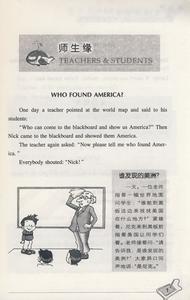
When she got back that night, she found her door broken open and her house ransacked. On the note she had left, she found the following message added:
"THANKS! WE HAVEN’T LEFT ANYTHING!"
布朗太太要外出一天。 她锁好了房门,在门上给送牛奶的人钉了一张便条:“家里没人,请不要留下任何东西!” 她当天晚上回家后发现房间门被撞开,房子被洗劫一空。在她留给送奶人的便条上,她发现被补充了一句:“谢谢!我们什么也没留下!”
 爱华网
爱华网